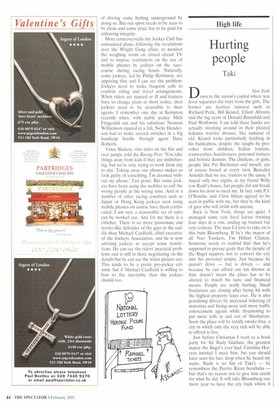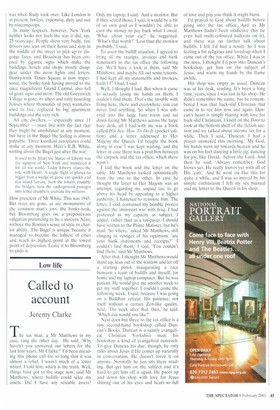Hurting people
Taki
DNew York own to the nation's capital where war fever separates the boys from the girls. The former are fearless samurai such as Richard Perle, Bill Kristol, Elliott Abrams and the tag team of Donald Rumsfeld and Paul Wolfowitz. I am told these hawks are actually strutting around in their pleated hakama warrior dresses, like samurai of old. Kristol looks particularly fetching in his battledress, despite the laughs he provokes from children, Italian tourists, transvestites, hairdressers, personal trainers and holistic dentists. The chickens, or girls, people like Pat Buchanan and myself, are of course booed at every turn, Benedict Arnolds that we are, traitors to the cause. I stayed only two nights, at my friend Willy von Raab's house, but people did not break down his door to meet me. In fact, only P.J. O'Rourke and Chris Isham agreed to be seen in public with me, but they're the kind of guys who will drink with anyone.
Back in New York, things are quiet. I managed some very hard karate training four days in a row, ending up bruised but very content. The man I'd love to take on is this bum Bloomberg. If he's the mayor of all Noo Yawkers, I'm Hillary Clinton. Someone needs to remind him that he's supposed to pursue goals that the people of the Bagel support, not to convert the city into his personal utopia. Just because he doesn't drive — but is driven — and because he can afford any tax thrown at him, doesn't mean the place has to be altered to match his taste and financial means. People are really hurting. Small businesses are closing after being hit with the highest property taxes ever. He is also penalising drivers by increased ticketing of motorists and hiring more and more traffic enforcement agents while threatening to put more tolls in and out of Manhattan. Soon the place will be totally smoke-free, a city in which only the very rich will be able to afford to live.
Just before Christmas I went to a book party for Sir Rudy Giuliani, the greatest mayor the Bagel's ever had, Carolina Herrera insisted I meet him, but you should have seen his face drop when he heard my name. Rudy is no fan of Taki's — he remembers the Puerto Rican brouhaha — but that's no reason not to give him credit for what he did. It will take Bloomberg one more year to have the city back where it was when Rudy took over. Like London is at present, lawless, expensive, dirty and run by nincompoops.
In many respects, however, New York neither looks nor feels the way it did, say, 25 years ago. People dress very badly, taxi drivers just lean on their horns and stop in the middle of the street to pick up or disgorge fares, and Broadway has been covered by gigantic signs which make the buildings, hotels and shops mostly disappear under the neon lights and letters. Honky-tonk Times Square is now impersonal, the honky-tonk having moved to the once magnificent Grand Central, also full of giant signs and neon. The old Greenwich Village is gone, its alleys and ratty boarding houses where thousands of poet wannabes used to live, replaced by big apartment buildings and the very rich.
All city dwellers especially since 11 September — must live with the fact that they might be annihilated at any moment, but here in the Bagel the feeling is almost palpable. Three kamikasi aeroplanes could strike at any moment. Here's E.B. White, writing about the Bagel just after the war:
It used to be [that] the Statue of Liberty was the signpost of New York and translated it for all the world. Today Liberty shares the role with Death. A single flight of planes no higeer than a wedge of geese can quickly end this island fantasy, burn the towers, crumble the bridges, turn the underground passages into lethal chambers, cremate the millions.
How prescient of Mr White. This was 1945. But trees are gone, as are monuments of the common man's joys, the honky-tonk, but Bloomberg goes on, a preposterous vulgarian pretending to be a modern Nero, without the Roman's sense of style or chariot ability. The Bagel is unique because it managed to become the loftiest of cities and reach its highest point at the lowest point of depression. Leave it to Bloomberg to undo it.



























































 Previous page
Previous page